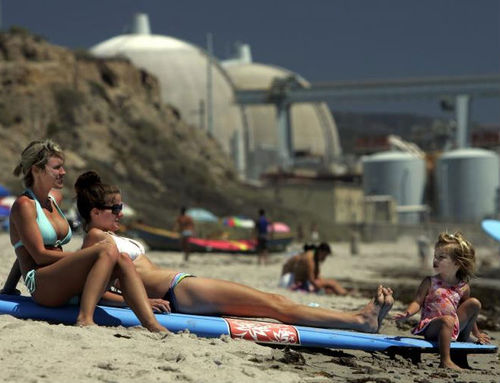Renewable Energy Needs Grow As San Onofre Nuclear Plant Closes

In the wake of Fukushima, Germany, Japan, and Scotland are moving away from nuclear power towards renewable energy. Germany plans to shut down their 17 nuclear reactors and replace them with wind and solar power. In effect, the European economic powerhouse is reconstructing its entire power generating system. Japan will have turned off all their nuclear reactors by May. The Japanese government may wish the plants were open, but their populace clearly doesn't. The slack will be taken up first by coal and natural gas, with long-term plans towards renewable energy to be announced soon. Scotland is on track to have 100% renewable energy by 2020 due to their massive wind, wave, and tidal power.
Meanwhile, here in the United States, we argue continually about power much like everything else, it seems. Why can Germany and Scotland achieve consensus on energy and move forward, while bickering, NIMBYs, and ideological opposition continues to block formation of a coherent energy plan here? Japan is also moving towards reliance on renewables, even if their government is doing so a bit grudgingly.
To demonstrate how Neanderthal the US is when it comes to energy, our country still has no offshore wind farms. That’s right, not a single turbine. Scotland and Germany already have serious offshore wind farms and there is a German plan going forward to install truly massive amounts of offshore wind. Japan has limited offshore turbines, but is at least trying. Texas will probably be the first in the US to have offshore wind. Liberals love to squeal about Texas, but that state gets it when it comes to energy and always has.
Recent events may force the issue in California and the rest of the country. The aging San Onofre Nuclear Generating Station in San Diego County is now closed indefinitely. A tube leak and resultant escape of a small amount of radioactive steam haled the plant for two months. Further inspections showed that hundreds of tubes have unusual, unexpected, and excessive wear. The Nuclear Regulatory Commission has ordered the plant closed. No one knows when, or even if, it will re-open. As a result, there could be power shortages in the region this summer. San Onofre generates 2 gigawatts, enough energy for 1.4 million homes. Replacement power will have to be found in the meantime, and officials are scrambling to find options.
Yes, nuclear power is completely reliable 99.99999 per cent of the time. But that last 0.00001 percent can be really problematic. Just ask the folks who live around Fukushima. Plus, there’s the continuing problem of how to store the radioactive waste. If Germany and Scotland can move towards 100% renewable energy, so can the United States. But we need to stop arguing about energy first.



